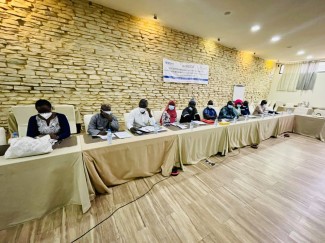UNODC supports 28 health care providers from all 14 regions in Senegal with a training on treatment and care of people who inject drugs in Senegal

Since December 2014, methadone maintenance treatment is available at the Centre de Prise en Charge Intégrée des Addictions à Dakar, Senegal (CEPIAD). This center, located within the Centre Hospitalier National Universitaire de Fann, allows for the integrated treatment of drug users and offers unconditional low-threshold services for people who inject drugs (PWID), prevention and treatment of HIV/AIDS infection and other comorbidities. However, access to care for injectable drug users remains very limited in the country. Most of the psychiatric care centers are confronted with a lack of personnel, a deficient technical platform, inadequate infrastructure and the absence of a legal framework for the implementation of unconditional low-threshold approaches.
Faced with these constraints, it is important to first strengthen the capacities of the service care providers and to harmonize the management practices in the treatment and care of people who inject drugs. This workshop aimed to train 28 health care providers (12 women and 16 men) from all 14 regions of Senegal on unconditional low-threshold approaches and techniques and on the management of PWID based on the Guide to the management of injecting drug users and the Training Guide for the management of injecting drug users developed by the MOH and CEPIAD. This training was made possible by the funding obtained through the Joint UN Senegal country Team on Health and HIV/AIDS using the UNODC UBRAF country envelope for Senegal.
Guided by the Professor Idrissa Ba and the Dr Ibrahima Ndiaye of CEPIAD, the participants at the end of the training:
1) acquired techniques and methods to treat and improve unconditional lowthreshold services offered to people using drugs; acquired knowledge of current concepts and procedures for administering care of these different substances (stimulants, hallucinogens, depressants and opioids);
2) developed adequate treatment plans for good patient care;
3) acquired skills in counselling techniques, motivation for change and relapse prevention; and
4) are expected to be able to disseminate these skills at the national level within their treatment centers/services.
With this training, service providers will be able to better identify the needs of treatment seekers and apply the best treatment plan (s).